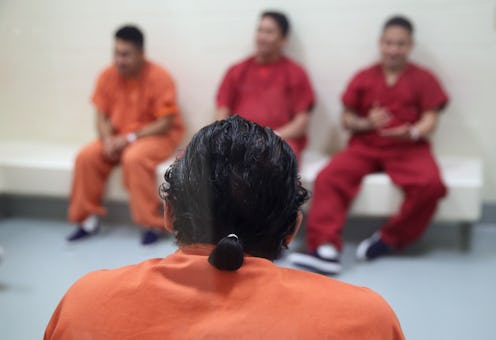News
How Trumps War On Immigrants Will Revive The For-Profit Prison Industry

President Trump said he would be a champion of "law and order." Cracking down on illegal immigration was one of his most ubiquitous campaign promises, and he's followed through with an announcement: The Trump administration will increase detention centers for immigration arrests, and privately run prisons are hoping to win some of those federal contracts. It would mean increased revenue, increased value — increased payouts to CEOs and investors. In America, the incarceration of human beings can translate into big profits. And a huge influx of arrested undocumented immigrants could fill thousands of prison beds that now sit empty.
"For years, the private prison industry has been propped up by our immigration detention system and this planned expansion will only further solidify that relationship," Tom Jawetz, vice president of immigration policy at the Center for American Progress, tells Bustle. Private prison companies, he says, could score "hundreds of millions of dollars worth" of federal contracts from the administration's plan to increase detention centers. "This is exactly the kind of swamp that needs to be drained," Jawetz adds.
Immigration and Customs Enforcement has issued "requests to identify" private prisons and their availability in a number of cities — Chicago, Detroit, St. Paul, Salt Lake City, and the southern region of Texas. With an increase of arrests, ICE needs somewhere to keep its growing population of incarcerated immigrants. For instance, the agency arrested 97,482 people between Jan. 22 and Sep. 9, an increase of 43 percent over the same span under President Obama.
It's a policy change that dovetails with the needs of privately run prisons, some of which have struggled to keep the lights on. Making a profit on a prison requires prisoners, and ICE's crackdown provides them.
The alliance between private prisons and ICE strikes many as an unholy one. For starters, private prisons do not release detailed information about their work programs, as is required of federal prisons.
This has led to lawsuits against two of the biggest private prison contractors, GEO Group and CoreCivic. In both cases, the companies were accused of exploiting immigrant labor. Detainees claimed they were forced into manual labor, sometimes at the rate of $1 a day, sometimes without payment at all. Those who refused faced harsh punishment — in some cases, prisoners alleged they were put into solitary confinement. According to Courthouse News, "A spokesperson for CoreCivic declined to comment on the lawsuit, but said that 'all work programs at our ICE detention facilities are completely voluntary and operated in full compliance with ICE standards.'”
As for GEO Group, they have settled several lawsuits out of court on a range of accusations, as well as lost at least one jury trial in a case of a prisoner who was beaten to death by two other inmates.
Many legal scholars argue there is no lawful basis for making immigrant detainees participate in forced labor. The charges against them are civil, not criminal, which means the 13th Amendment's allowance for prison labor does not apply.
Those legal issues haven't seemed to slow down private prison companies. GEO Group recently purchased two detention centers in Texas, reportedly with the expectation that Trump's crackdown on illegal immigration would require more holding facilities. The Justice Department announced back in January that it was on the market for just such spaces.
Conflicts of interest are also a real possibility for GEO Group and CoreCivic. Both companies donated big sums to Trump's inauguration, and frankly, it's not hard to see why that would be a good idea for their bottom line. Jonathan Burns, director of public affairs at CoreCivic, tells Bustle, "CoreCivic plays absolutely no role in, and takes no position on, the federal government's immigration or enforcement policies."
The prison industry can be extremely lucrative. George Zoley, CEO of GEO Group, made $6 million in salary plus bonuses in 2012, and a staggering $23 million in his GEO Group stocks. Henri Widdell, a primary investor in another private prison corporation, Corrections Corporation of America, held stocks in that company that were worth a cool $25 million in 2013.
Of course, prisons are not profitable without a steady flow of prisoners. And Trump's "law and order" administration seems set to ensure that ICE will keep arrest numbers high.